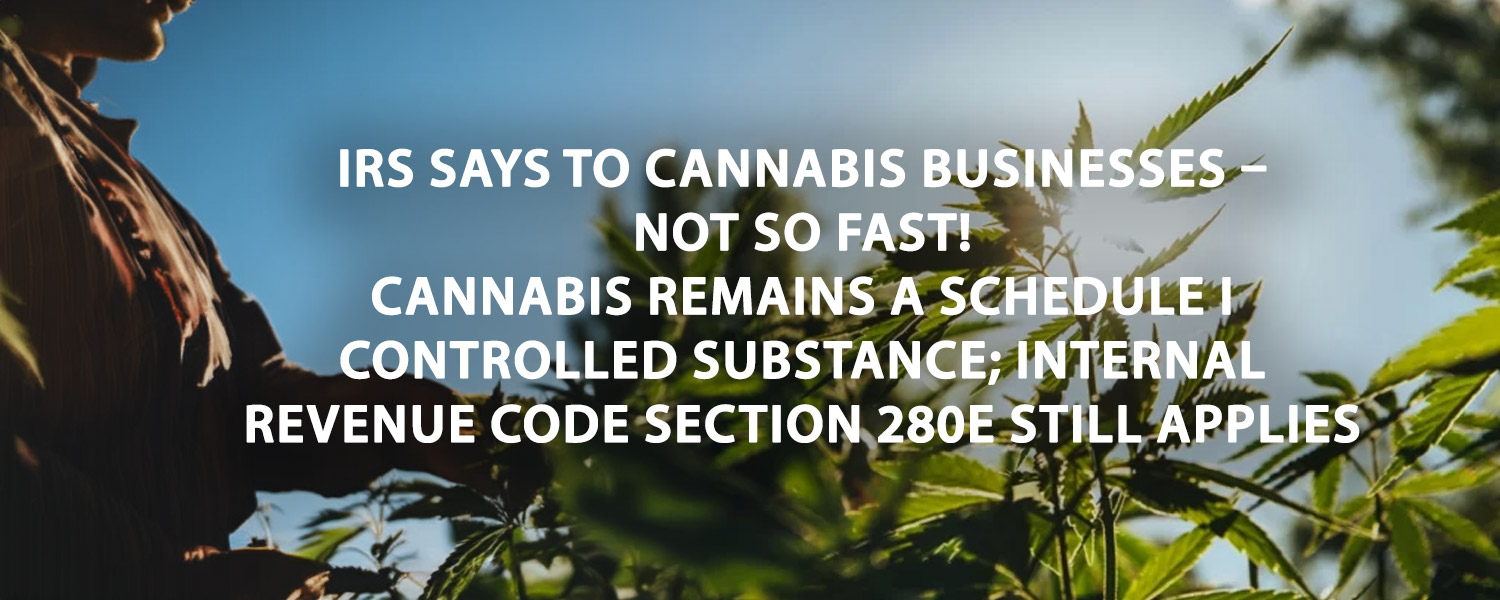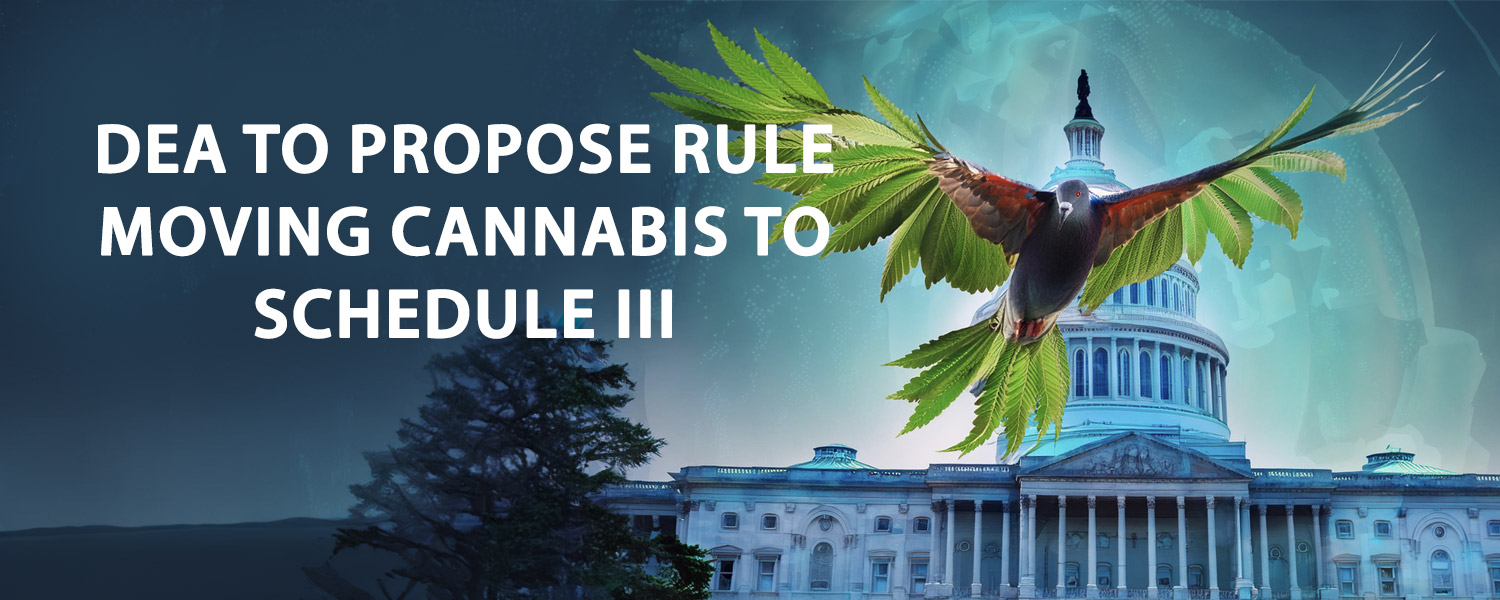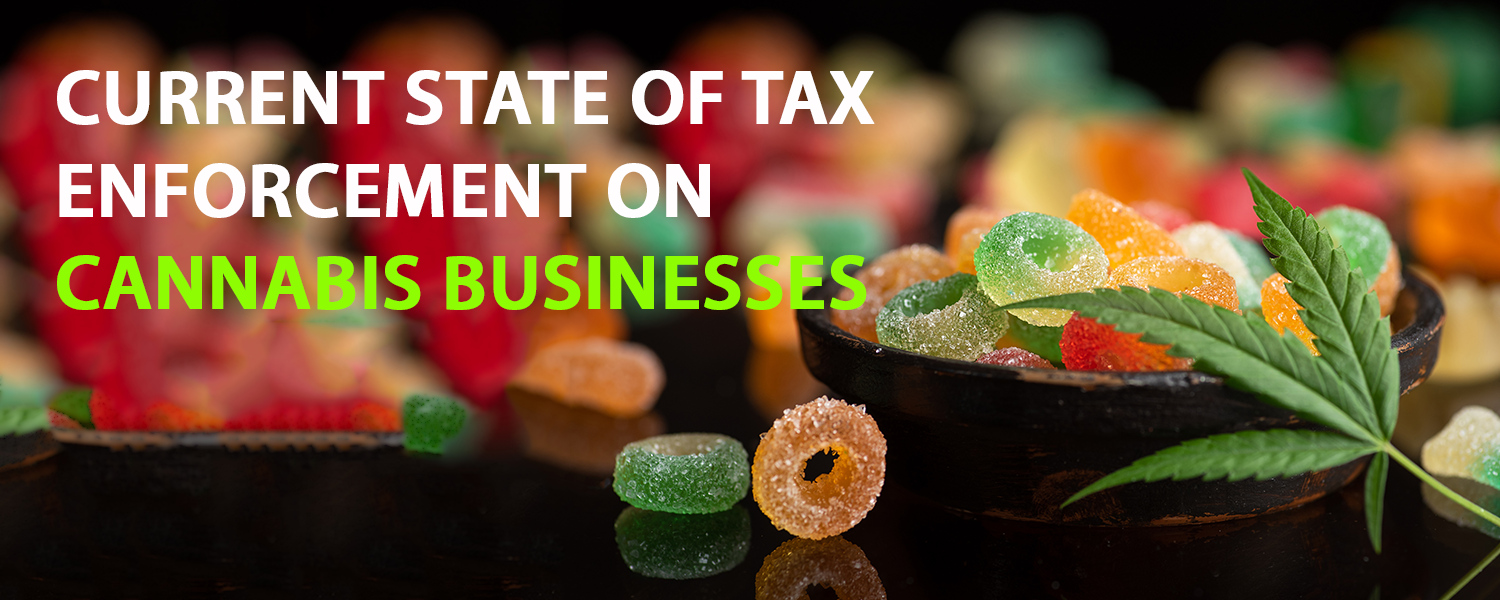IRS Says To Cannabis Businesses – Not So Fast! Cannabis remains a Schedule I controlled substance; Internal Revenue Code Section 280E still applies
The Associated Press reported on April 30, 2024 that the Drug Enforcement Administration (“DEA”) will propose a rule to reschedule cannabis to Schedule III under the Controlled Substance Act. The proposed rule has since been reviewed by the Department Of Justice and on May 16, 2024 has been published in the Federal Register. Next the DEA will take public comment on the plan to move cannabis from its current classification as a Schedule I drug, alongside heroin and LSD. It moves pot to Schedule III, alongside ketamine and some anabolic steroids, following a recommendation from the federal Health and Human Services Department. After the public comment period and a review by an administrative judge, the agency would eventually publish the final rule in the Federal Register.
The IRS announced on June 28, 2024 that until a final federal rule is published, cannabis remains a Schedule I controlled substance and is subject to the limitations of Internal Revenue Code. The law with respect to the schedule or classification of cannabis has not changed; therefore, taxpayers seeking a refund of taxes paid related to Internal Revenue Code Section 280E by filing amended returns are not entitled to a refund or payment.
Although the law has not changed, the IRS says that some taxpayers are filing amended returns. The IRS also says that while the grounds for filing such claims vary, these claims are not valid. The IRS says it will be taking steps to address these claims.
Internal Revenue Code Section 280E
Section 280E disallows all deductions or credits for any amount paid or incurred in carrying on any trade or business that consists of illegally trafficking in a Schedule I or II controlled substance within the meaning of the federal Controlled Substances Act.
This applies to businesses that sell cannabis, even if they operate in states that have legalized the sale of cannabis. Section 280E does not, however, prohibit a participant in the cannabis industry from reducing its gross receipts by its properly calculated cost of goods sold to determine its gross income.
The Growing Trend In Legalizing Cannabis – Current Standings:
Medical cannabis is legal in 38 states.
The medical use of cannabis is legal (with a doctor’s recommendation) in 38 states and Washington DC. Those 38 states being Alabama, Alaska, Arizona, Arkansas, California, Colorado, Connecticut, Delaware, Florida, Hawaii, Illinois, Kentucky, Louisiana, Maine, Maryland, Massachusetts, Michigan, Minnesota, Mississippi, Missouri, Montana, Nevada, New Hampshire, New Jersey, New Mexico, New York, North Dakota, Ohio, Oklahoma, Oregon, Pennsylvania, Rhode Island, South Dakota, Utah, Vermont, Virginia, Washington and West Virginia. The medical use of cannabis is also legal in the territories of the Northern Mariana Islands, Guam and Puerto Rico.
Recreational cannabis is legal in 24 states.
Twenty-three states and Washington DC, have legalized cannabis for recreational use — no doctor’s letter required — for adults over the age of 21. Those 23 states being Alaska, Arizona, California, Colorado, Connecticut, Delaware, Illinois, Maine, Maryland, Massachusetts, Michigan, Minnesota, Missouri, Montana, Nevada, New Jersey, New Mexico, New York, Ohio, Oregon, Rhode Island, Vermont, Virginia and Washington and the territories of the Northern Mariana Islands and Guam.
Recreational cannabis is legal in 6 tribal nations.
Six Tribal nations have legalized cannabis for recreational use. Those 6 tribes being the Flandreau Santee Sioux Tribe (South Dakota), Oglala Lakota Sioux Tribe (South Dakota), Suquamish Tribe (Washington state), Squaxin Island Tribe (Washington State), Eastern Band of Cherokee Indians (North Carolina) and St. Regis Mohawk Tribe (New York).
The New Rule If Approved Will Result In A Tax Regime Similar To What Non-Cannabis Businesses Face.
Currently, under Federal law (Controlled Substances Act 21 U.S.C. 801) cannabis is designated as a Schedule I controlled substance due to the historical belief that it has a high potential for abuse, no currently accepted medical use in treatment, and lack of accepted safety for use under medical supervision.
Generally, businesses can deduct ordinary and necessary business expenses under I.R.C. §162. This includes wages, rent, supplies, etc. However, in 1982 Congress added I.R.C. §280E. Under §280E, taxpayers cannot deduct any amount for a trade or business where the trade or business consists of trafficking in controlled substances…which is currently prohibited by Federal law. Cannabis, including medical cannabis, is a controlled substance. What this means is that dispensaries and other businesses trafficking in cannabis have to report all of their income and cannot deduct rent, wages, and other expenses, making their marginal tax rate substantially higher than most other businesses. Therefore, under current law, the Internal Revenue Code which treats businesses in the cannabis industry differently resulting in such business paying at least 3-times as much in taxes as ordinary businesses.
The New Rule If Approved DOES NOT Change Reporting Of Cash Payments.
The Bank Secrecy Act of 1970 (“BSA”) requires financial institutions in the United States to assist U.S. government agencies to detect and prevent money laundering. Specifically, the act requires financial institutions to keep records of cash purchases of negotiable instruments, and file reports of cash purchases of these negotiable instruments of more than $10,000 (daily aggregate amount), and to report suspicious activity that might signify money laundering, tax evasion, or other criminal activities. The BSA requires any business receiving one or more related cash payments totaling more than $10,000 to file IRS Form 8300, Report of Cash Payments Over $10,000 Received in a Trade or Business.
The minimum penalty for failing to file EACH Form 8300 is $25,000 if the failure is due to an intentional or willful disregard of the cash reporting requirements. Penalties may also be imposed for causing, or attempting to cause, a trade or business to fail to file a required report; for causing, or attempting to cause, a trade or business to file a required report containing a material omission or misstatement of fact; or for structuring, or attempting to structure, transactions to avoid the reporting requirements. These violations may also be subject to criminal prosecution which, upon conviction, may result in imprisonment of up to 5 years or fines of up to $250,000 for individuals and $500,000 for corporations or both.
Cannabis-related businesses operate in an environment of cash transactions as many banks remain reluctant to do business with many in the cannabis industry. Like any cash-based business the IRS scrutinizes the amount of gross receipts to report and it is harder to prove to the IRS expenses paid in cash. So it is of most importance that the proper facilities and procedures be set up to maintain an adequate system of books and records.
How Do You Know Which Cannabis Tax Attorney Is Best For You?
While the Federal government is still considering whether to reschedule cannabis, it is premature to file any amended income tax returns before the rule to reschedule has been finalized. Given that cannabis is still illegal under existing Federal law you need to protect yourself and your cannabis business from all challenges created by the U.S. government. Additionally, assuming that this new rule is approved – ONLY LICENSED cannabis operators can benefit. So it is best to be proactive and engage an experienced cannabis tax attorney in your area who is highly skilled in the different legal and tax issues that cannabis businesses face. Let the cannabis tax attorneys of the Law Offices Of Jeffrey B. Kahn, P.C. located in Orange County (Irvine), the Inland Empire (Ontario and Palm Springs) and other California locations protect you and maximize your net profits. And if you are involved in crypto currency, check out what a bitcoin tax attorney can do for you.










 Follow
Follow Follow
Follow